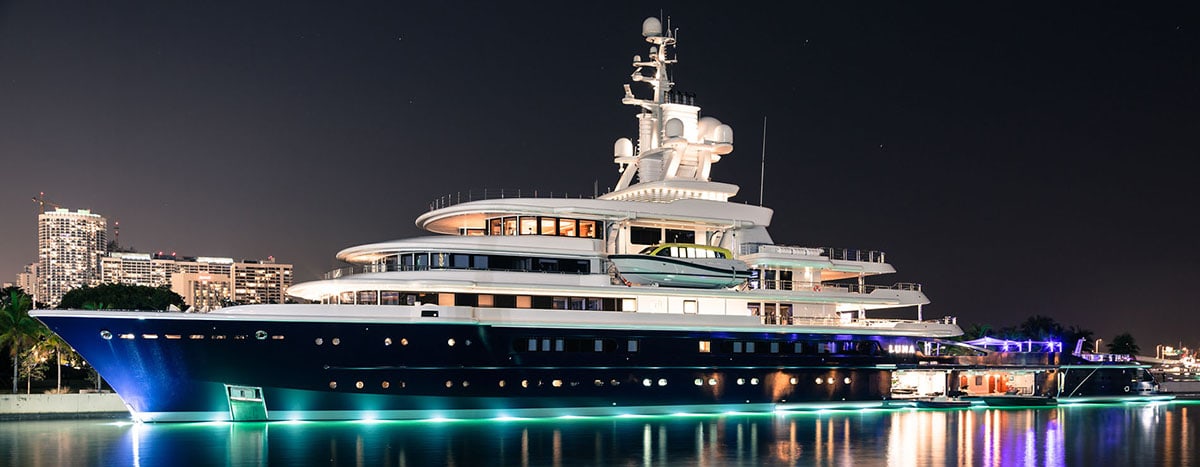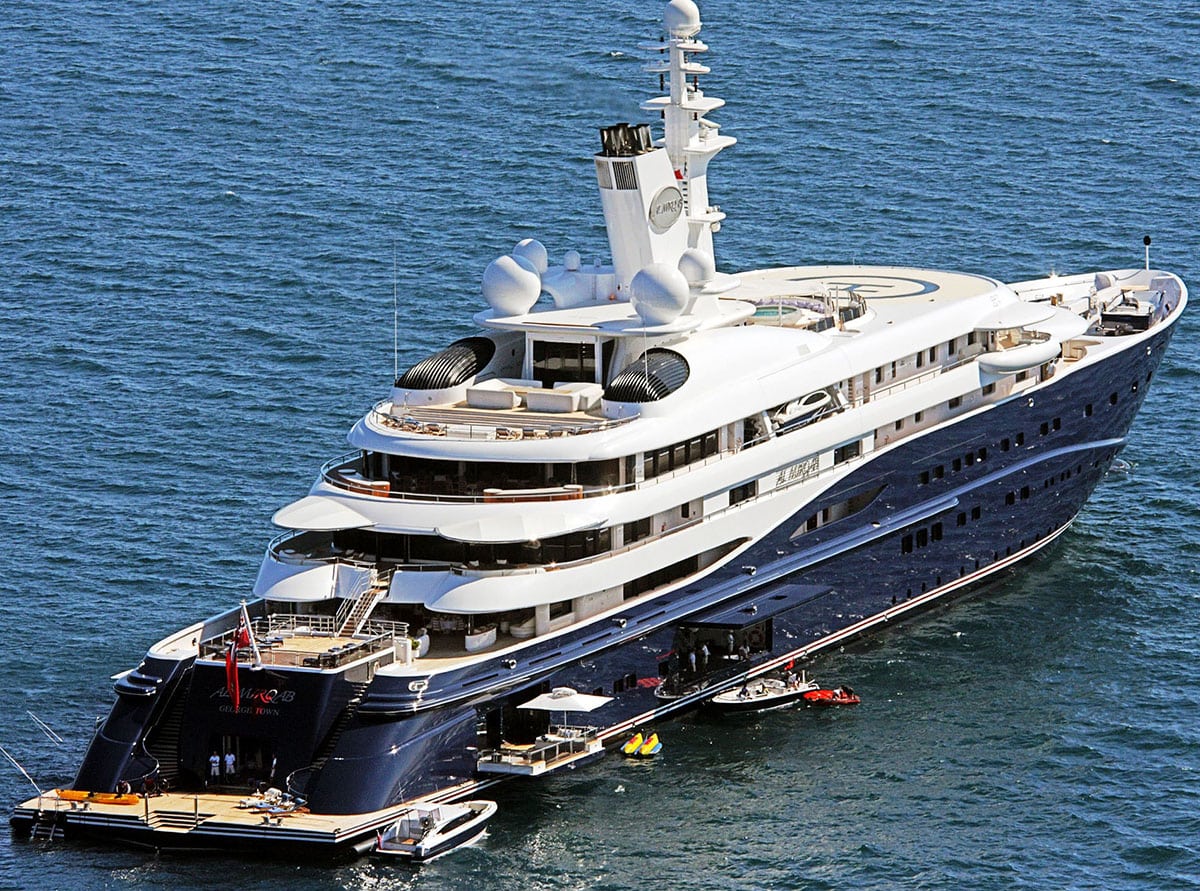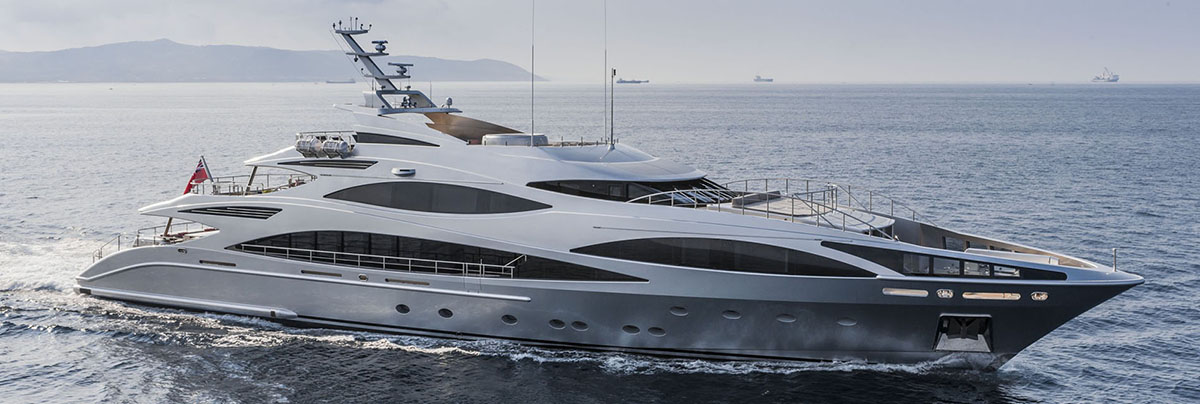Yacht
Financing
Assets America® offers luxury yacht financing for yachts, super yachts and mega yachts starting at $10 million and beyond! Yachts are watercraft used for sports, commercial use (chartering) or pleasure (including fishing) with a minimum length of 50 feet. Super-yachts are large, expensive, professionally-crewed yachts, informally sized at 79 feet or greater, although the dividing line is somewhat subjective. Finally, mega-yachts are the biggest and most expensive yachts, starting from 164 feet and beyond.
Video: Benetti Super Yacht Tour
Yacht Valuation
Yachts are configured as sailing or power vessels, although many sailing yachts have motors as a backup. While yachts can be quite large, however, they are dwarfed by commercial maritime vessels like oil tankers, ocean cruise liners, and cargo ships. Yachts can yield income through chartering, which can figure into the process of obtaining yacht loans. Super-yacht and mega-yacht designs also reflect the personal tastes of their owners. These specializations affect the yacht’s value for financing purposes.
Many factors figure into the evaluation of a luxury yacht, for example:
- Purpose of the vessel
- Size
- Number of engines
- Sleeping accommodations
- Crew size (if any)
- Chartering income (if applicable)
- Suitability for different sea conditions
- Fuel consumption
- New versus used
- Legal jurisdiction of the lender, the borrower, and the yacht itself
Take note that international considerations can complicate the process. In other words, financing must account for different laws and cross-border tax implications.
Yacht Financing from Assets America®
If you want to purchase a yacht, or build your own newbuild, or lease a yacht, check out our yacht finance packages. We can arrange yacht loans that will meet your requirements, even if you are somewhat credit challenged. Our yacht loans start at $10 million. Don’t postpone purchasing the yacht you deserve. Rather, call our offices today at (206) 622-3000, or simply fill out the below form for a prompt response!
Apply For Yacht Financing
Yacht Survey
For yacht financing and insurance purposes, a yacht, superyacht or megayacht must undergo a survey, a procedure similar to a home inspection. The three types of yacht surveys are:
- Insurance survey: This type of survey is for renewal of insurance policies, not for acquisition. It is a light inspection that tries to identify outstanding issues.
- In-shore and coastal survey: This is the most common survey and is a good choice for many yacht purchases. It includes a full equipment listing, a confirmation of the hull number (much like a car’s VIN), complete system testing, and an out-of-water check of running gear, hull, and bottom paint.
- Offshore survey: This is the most time-consuming and comprehensive survey, appropriate for ocean-going yachts. It includes the in-shore and coastal survey, but also ultrasonic tests, hull moisture tests, heat-sensing scans, engine manifold tests, and more.
Yacht-Building Contracts
The individual nature of luxury yachts means that yacht-building contracts are not standardized the way that oil tanker contracts are standardized. The yacht building yard will enumerate all the luxury yacht buyer’s individual requirements in the contract, which will probably go through several drafts before finalization.
The contract structure reflects the obligations of the builder and the buyer. It will also include warranties, tax provisions, and often, confidentiality clauses, as the owner of a mega yacht often wants to keep a low profile. Ideally, the shipyard delivers to the buyer the yacht exactly as specified, and the buyer receives a clean title upon payment of the purchase price.
Yacht Registration
Yachts must be registered in a country, but not necessarily in the country of the seller or the buyer. Registration is fairly easy as long as the yacht meets certain criteria, such as technical standards and age. This holds especially true in “open registry” countries like Liberia, Panama, Cyprus, and the Bahamas. “Offshore registry” countries are usually colonies or dependencies. For example, there are the Netherland Antilles, Cayman Islands and the Isle of Mann. If the owner is a U.S. citizen, yachts weighing 5 tons or more can be registered at the National Vessel Documentation Center of the U.S. Coast Guard. Coast Guard documentation also offers access to a preferred mortgage that gives the lender certain benefits. However, most U.S. yacht lenders require that financed yachts are documented.
Financing a Yacht
When purchasing an existing yacht, borrowers usually take out yacht mortgages on vessels. However, arrangements differ between yacht building contracts and chartered yachts. Other influencing factors include the current and proposed registration jurisdictions, the tax treatment of the yacht, and the owner’s tax status. In conclusion, yacht financing protects the lender from the borrower’s other creditor claims.
Yacht Loans
Private commercial lenders like Assets America® can arrange yacht financing, as well as banks, credit unions, boat brokers and yacht manufacturers. Typically, the loan agreement takes on a basic asset-financing structure, collateralized by the fully amortizing yacht mortgage and a lien on the yacht, as well as insurances signed over to the lender. In addition, the loan agreement may give the lender a lien on any revenues generated by chartering the yacht. Finally, the lender will most probably require a personal guarantee and/or debenture from the borrower. This gives the lender a lien on the borrower’s other assets as well.
Yacht-Building Loans
For yacht-building contracts, the loan agreement will provide for cash advances to pay for pre-delivery construction milestones. Payments start with a pre-build deposit by the buyer. Installment payments follow as construction progresses through succeeding stages, evidenced by Stage Certificates. Pre-delivery requirements also include assignment of the yacht-building contract. In the case of default, the contract gives the lender the right to have the builder finish construction. Then the lender takes possession of the vessel and sells it. Accordingly, the yacht financing lender releases funds to the yacht builder upon receipt of each Stage Certificate. These must include the counter-signature of an independent surveyor. The yacht-building contract usually contains clauses that specify what happens if default occurs either by the builder or the buyer.
All loan agreements contain language relevant to warranties, insurances, and registration. The lender might also require covenants that preclude certain uses of the yacht, such as chartering. Finally, the borrower’s surveyor will have inspection rights to protect the borrower’s interests.
Yacht Leases
Some people choose to lease their yachts rather than purchase them. In this case, the lessor gains title to the yacht and leases the yacht back to the lessee for an agreed term. These leases are usually “demise charters” that provide the lessee exclusive use of the yacht. In other words, the lessee is the operational “owner,” while the lessor maintains the title.
Glossary of Marine Lending Terms
| Term | Definition |
|---|---|
| Accessorial Charges | A fee for services such as loading, unloading, pickup, and delivery |
| Bluewater Vessel | Any form of boat or ship suitable and equipped for sailing or motoring on the open ocean |
| Charter Party | The individual or group hiring the shipowner and/or captain for temporary use of the vessel |
| Demise Charter | Also called a bareboat charter, this is an arrangement to hire a water vessel whereby no crew or provisions are included as part of the agreement |
| IRC Section 163 | A code of the IRS designating a water vessel as a qualified residence and therefore capable of receiving tax advantages |
| Length Over All (LOA) | The length of a yacht as measured from "stem to stern.” Marinas and harbors often use this metric to determine how much to charge for a slip or similar accommodation |
| Lien | A legal right that guarantees an underlying obligation, for example repayment of a loan |
| Manifest | A list of all individuals, cargo, and equipment on board |
| Voyage Charter | A contract whereby the captain and/or shipowner places the yacht at the disposal of the charter party for one or more voyages to one or more destinations, while the captain and/or shipowner remains responsible for the operation of the yacht |
| Tramp Schedule | Vessels operating without a fixed itinerary or schedule or charter contract |
| Superyacht | Also called Megayachts, the terms often refer to yachts with an LOA of over 164 feet and/or full-time staff and crew |
| Yacht Charter | A contract wherein the yacht is rented out fully staffed to an individual for a limited amount of time, typically a matter of days or weeks |
Yacht Financing – FAQs
-
How is the current market for yachts and superyachts?
Across the world, the boating market—whether monohull sailboats, catamarans, yachts, or superyachts—is a buyer’s market and should remain that way for the foreseeable future. Because fiberglass and other light, super-durable hybrid materials last so long, the market has become increasingly flooded. Often multimillion-dollar yachts are selling for a fraction of what they were just 7-10 years ago.
-
Is there a best time to purchase a yacht?
The simple answer is yes, at the beginning of the off-season, although that varies around the world and especially between the northern and southern hemispheres. In Florida for instance, the best time to buy a yacht is mid to late August.
-
What are the costs involved with maintaining a yacht?
In addition to purchasing the yacht, owners typically pay for mooring and storage, insurance, operational costs, crew, maintenance, and winterization. These costs can be rather substantial. Before purchasing a yacht, one needs to make sure they are financially secure.
-
Can my yacht qualify for tax advantages?
Yes, for example, if a yacht has a berth, head, and galley, then it can qualify as a second home.
-
What is the least and most amount of financing I can receive?
While our loans start at a bare minimum of $10 million, there is no upper limit to the amount of financing available to you via Assets America®.
-
What kind of down payment should I expect to make?
While the standard down payment is 20% to 30%, really strong borrowers may be able to make a smaller down payment depending on the quality of their credit, their financial statement, and their cash position.
Online Resources for Yacht Financing and More:
- First, for tips on buying and financing your first luxury yacht, check out these articles from Boat International, Cruising World, and Marina Reservation.
- Second, Boat International also provides Yacht Market Reports and Superyacht Market Reports.
- Moreover, if you’re interested in environmentally friendly yachting, consider checking out Blue Flag International.
- In addition, you may also enjoy this Guide To Yacht Financing from the law firm Field Fisher Waterhouse, although if you’re serious about financing a yacht or superyacht, the best way forward is to speak with a seasoned professional.
- Finally, The New York Times has an excellent article The Beginner’s Guide to Chartering a Yacht with Crew.
Related Articles
- Complete Guide to Ship Financing
- How to Raise Your Credit Score in 30 Days – 20 Smart Ideas
- How to Work with Commercial Loan Brokers
- 6 Keys to Impress Commercial Lenders
- Sale Leaseback – Everything You Need to Know (Coming Soon)








